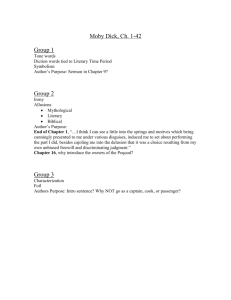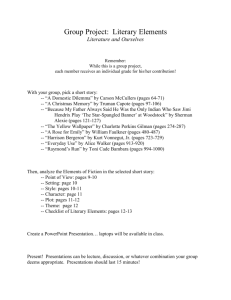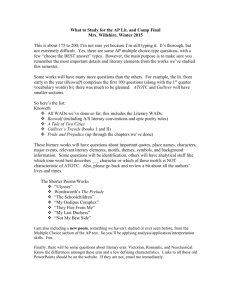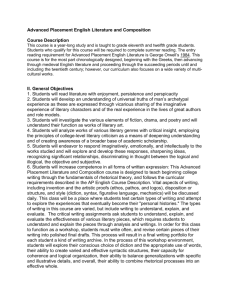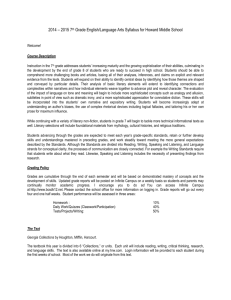English2722007 - Santiago Canyon College
advertisement
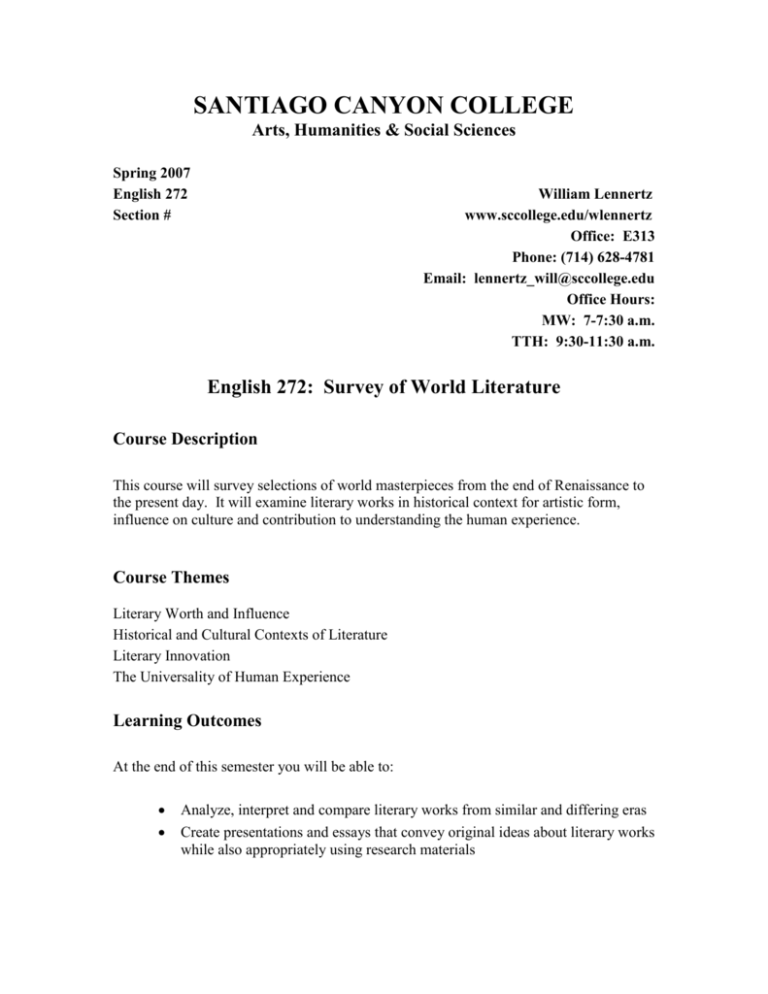
SANTIAGO CANYON COLLEGE Arts, Humanities & Social Sciences Spring 2007 English 272 Section # William Lennertz www.sccollege.edu/wlennertz Office: E313 Phone: (714) 628-4781 Email: lennertz_will@sccollege.edu Office Hours: MW: 7-7:30 a.m. TTH: 9:30-11:30 a.m. English 272: Survey of World Literature Course Description This course will survey selections of world masterpieces from the end of Renaissance to the present day. It will examine literary works in historical context for artistic form, influence on culture and contribution to understanding the human experience. Course Themes Literary Worth and Influence Historical and Cultural Contexts of Literature Literary Innovation The Universality of Human Experience Learning Outcomes At the end of this semester you will be able to: Analyze, interpret and compare literary works from similar and differing eras Create presentations and essays that convey original ideas about literary works while also appropriately using research materials Demonstrate a knowledge of the history of ideas and literature from the beginnings of writing to the Renaissance through discussion, written exams and out-of-class projects Examine literary works in light of philosophical themes, troubling human questions and personal decisions View all literature as a doorway into the human heart and soul Assessment Tasks Give a presentation on a work that inspires and intellectually interests you. You will create an original response to it. It could be an essay concerning an aspect of the work. It could be a visual piece representing one part or the whole of the work. It could be a short story, a poem or other creative work—including a short movie or Power Point presentation. You will submit the work to me and present your work to the class. Your class presentation should be roughly three to five minutes in length. Demonstrate understanding of literary works and eras through four written exams. Each exam will cover one era—the Age of Reason, the Romantics, Realism, and the Modern World. A variety of thematic questions are typically used for exams. You will need a standard 8 ½” by 11” blue book for each exam. Write an 8-10 page research paper. Your research topic will be yours to select, but it must be approved by me. Follow the MLA format. You need a minimum of five sources. Read and discuss weekly assignments. I will provide reading quizzes and questions to check your progress each week. Learning Resources Required Texts The Norton Anthology of World Literature, 2nd edition, volume .D, E,F Required Materials and Expenses Four standard blue books Media and other materials for your creative response. This may vary greatly depending on the nature of your response. If you need a computer or DVD cart that can be arranged. Notify me and I will make arrangements for appropriate college machinery. Attendance and Tardiness I expect you to be in class on time. Some in-class work cannot be made up. Your attendance, therefore, is essential. Excessive absences will be deal with according to the current catalog guidelines. It is the student’s responsibility to drop the course. Important Dates: Last day to drop with enrollment fee refund: Last day to drop with "W" grade: Assessment and Grading: The following points will determine your grade: Project/Presentation 75 Research Paper 200 Exams 600 Reading Responses/Quizzes 125 1,000 Letter Grades for the Semester: Your letter grade will be determined as follows: 1,000 – 900 = A 899 – 800 = B 799 – 700 = C 699 – 600 = D 599 – 0 = F Borderline Grades: I deal with borderline grades using a simple mathematical principle – rounding. If you are within 5 points of the next letter grade, I will round up your grade. If you are not, I will not. Please refrain from begging and pleading regarding grades. I stand firm. Each assignment is kept as a numeral in my grade book until your final grade is calculated. I am always open to discussing your grades with you. All work must be turned in on the due date. NO LATE WORK ACCEPTED. If you are ill, someone should drop your paper on the due date or you should turn it in on your return. ACADEMIC HONESTY POLICY Students of Santiago Canyon College are expected to be honest and forthright in their academic endeavors. To falsify the results of one’s research, to steal the words or ideas of another, or to cheat on an examination, corrupts the essential process by which knowledge is advanced. Academic dishonesty is seen as an intentional act of fraud, in which a student seeks to claim credit for the work or efforts of another without authorization, or uses unauthorized materials or fabricated information in any academic exercise. As an institution, we also consider academic dishonesty to include forgery of academic documents, intentionally impeding or damaging the academic work of others, assisting other students in acts of dishonesty or coercing students into acts of dishonesty Classroom Behavior 1. 2. 3. 4. No cell phone use in class. Practice kindness and honesty during class discussions—allowing others to speak. Listen to others and seek to understand them and their words. Avoid non-related, secondary conversations during class discussions and activities. Accommodations for Disabilities Students with verifiable disabilities who want to request academic accommodations are responsible for notifying their instructor and Disabled Students Programs and Services (DSPS) as early as possible in the semester. To arrange for accommodations, contact DSPS at (714) 628-4860, (714) 639-9742 (TTY) or stop by the DSPS Center in U114. A Final Word Studying literature is a study of many things. All of us can contribute to the understanding of a literary work. Don’t be afraid to use all of your experiences to relate to literature. We want to open a door for ourselves to every work. Once we do, other parts become accessible. Schedule February 7 Introduction 14 Moliere--Tartuffe 21 Racine—Phaedra, Swift—“A Modest Proposal” Pope—“The Rape of the Lock.” 28 Voltaire—Candide March 7 Cao Xueqin—The Story of the Stone,Wu-- Monkey 14 Basho/ Enlightenment Exam--#1 21 Goethe—Faust 28 Blake, Wordsworth, Pushkin April 4 Spring Break 11 Whitman, Dickinson/ Romantic Exam #2 18 Flaubert/ Baudelaire 25 Dostoyevsky May 2 Chekov/Tolstoy 9 Rilke, Woolf,/ Realism Exam #3 16 Proust/Eliot/ Selected 23 Borges/Kafka/Marquez/ Selected Poems 30 Exam Modern Period



